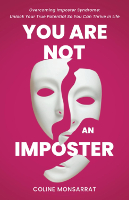
Image by Juan Boche
Self-talk is the ongoing internal dialogue we have with ourselves. It is the voice that tells us: “It is not even worth trying, you cannot succeed” or “Give it your best shot. Even if you don’t succeed, you will learn something new.”
And guess what? We are in control of that voice!
Being Aware of Our Self-Talk
The way we talk to ourselves matters as it also affects how we feel about ourselves. In fact, our brains believe what we tell it. If we constantly have negative self-talk, our brains will start to believe those negative thoughts and affect our actions and emotions in a negative way.
If you keep telling yourself negative things, you will continue feeling bad about yourself. But if we consciously focus on having positive self-talk, our brains will begin to believe those positive thoughts and ultimately lead to more positive emotions and actions.
If we have a negative reflection of ourselves, we will be more inclined to take everything people tell us personally. We will not be able to distinguish when they are only projecting onto us something that troubles them. We will automatically believe that they are right. That is why it is important to be aware of our self-talk.
Don’t Believe Every Stupid Thing You Think
Consider if you would speak this negatively to someone else. Most of the time, you probably wouldn’t, so apply this concept to yourself.
I used to be so skeptical about this concept. How could I, by only talking, influence how my brain thinks? Let’s just say that now, I never believe every stupid thing I think. We need to learn how to control our thoughts so we can live better.
The good news is that we can practice and learn to change our self-talk. In a 2020 interview with Tim Ferriss, well-known motivational speaker Brené Brown called the negative voice in her head a “gremlin.” By giving the voice an identity, she distances herself from it and can objectively look at her self-talk to change it. This is something we can try; I will call mine a “troll.” What about you?
The Role of Low Self-Esteem
To understand how low self-esteem can lead to imposter syndrome, we need to understand the difference between self-esteem and self-confidence. Self-confidence is the belief that you can do something, whereas self-esteem is an ingrained belief about who you are. If you have low self-esteem, by default, you will have low self-confidence.
If we excel despite low self-confidence (in other words, we do not think we’re capable of the achievement), we feel as if we do not deserve the achievement and worry others may find out that we are incompetent; the achievement was “lucky.” The imposter in our mind is created.
One of the Biggest Challenges for an Imposter
Building ultimate confidence might be one of the biggest challenges for an imposter. At least, it was for me. But the efforts you will put toward this step are crucial when you know how confidence plays a role in your life.
To build confidence in ourselves, we must erase self-doubt and build self-esteem as all these emotions intertwine. If we doubt our abilities, we will never be able to have good self-esteem. And if we have low self-esteem, how can we feel self-confident? We just cannot. And that is why we need to rewire our brain and one by one debunk the beliefs that led us to low self-esteem so we can finally build confidence in ourselves.
I had very low self-esteem until recently. I was, however, an outstanding actor and able to hide it quite well from people around me. I would demonstrate confidence at work and in my personal life. However, deep down, my behaviors clearly showed quite the opposite when you analyzed them. They revealed how I doubted my abilities.
The low self-esteem that I had developed as a kid due to my disease and abandonment was now affecting all areas of my life. I was completely aware of my low self-confidence for years (one of the rare things I was aware of), and I tried fixing it by following methods by well-known therapists and psychologists. I kept repeating affirmations in front of my mirror, “I am enough,” writing them down every morning, and so on.
They did work to some extent. What we say to our brains has a powerful effect. But it was only on the surface. And there is an apparent reason why they could not work as much as I was trying to convince myself that I was a worthy and confident person: I did not believe it.
It was only when I changed my perception that I began to change.
Realizing True Happiness
But perhaps the greatest cost of low self-confidence is missing out on the chance to be truly happy. When we constantly put ourselves down, we miss out on celebrating our own successes and learning from our failures. We sell ourselves short and hinder our own growth.
So that’s why we need to shift our mindset. We need to change how we see ourselves.
Imagine everything you’ve lost or stand to lose due to your lack of confidence. You may hesitate to speak up in meetings, network with new people, and take on new challenges at work. Your relationships suffer because you don’t believe in yourself enough to assert your needs and wants. You miss out on opportunities for growth and advancement because you doubt your abilities.
So let’s stop adding to the list and change instead.
Copyright 2023. All Rights Reserved.
Source of this article:
Book: You Are Not an Imposter
You Are Not an Imposter: Overcoming Imposter Syndrome: Unlock Your True Potential So You Can Thrive in Life
by Coline Monsarrat
 Do you ever feel like a fraud, fearing that others will discover you're not as competent or deserving as they think? You're not alone. Imposter syndrome affects a staggering 70% of people at some point in their lives. But what if you could break free from its grip and live with confidence and authenticity?
Do you ever feel like a fraud, fearing that others will discover you're not as competent or deserving as they think? You're not alone. Imposter syndrome affects a staggering 70% of people at some point in their lives. But what if you could break free from its grip and live with confidence and authenticity?
Part memoir, part guide, this transformative book uncovers how imposter syndrome silently infiltrates various areas of our lives. From sabotaging our careers to undermining our well-being, its impact is far-reaching and often underestimated. Coline Monsarrat dives into the science behind the condition, unraveling the psychological mechanisms that give rise to self-doubt, perfectionism, low self-esteem, and people-pleasing tendencies. Coline offers practical strategies derived from her personal journey, equipping readers with the tools to break free from imposter syndrome's grasp.
For more info and/or to order this book, click here. Also available as an audiobook, Hardcover, and a Kindle edition.
About the Author
 Coline Monsarrat is a passionate author driven by a mission to help others thrive. She weaves captivating stories that transcend boundaries. Whether through her insightful nonfiction work or the adventure MG book series, Aria & Liam, she imparts valuable wisdom that inspires readers to overcome challenges and embrace their potential. Her new book, You Are Not an Imposter: Overcoming Imposter Syndrome: Unlock Your True Potential So You Can Thrive (Apicem Publishing, April 11, 2023), offers a powerful and personal exploration of this all-too-common condition. Learn more at youarenotanimposter.com.
Coline Monsarrat is a passionate author driven by a mission to help others thrive. She weaves captivating stories that transcend boundaries. Whether through her insightful nonfiction work or the adventure MG book series, Aria & Liam, she imparts valuable wisdom that inspires readers to overcome challenges and embrace their potential. Her new book, You Are Not an Imposter: Overcoming Imposter Syndrome: Unlock Your True Potential So You Can Thrive (Apicem Publishing, April 11, 2023), offers a powerful and personal exploration of this all-too-common condition. Learn more at youarenotanimposter.com.

























